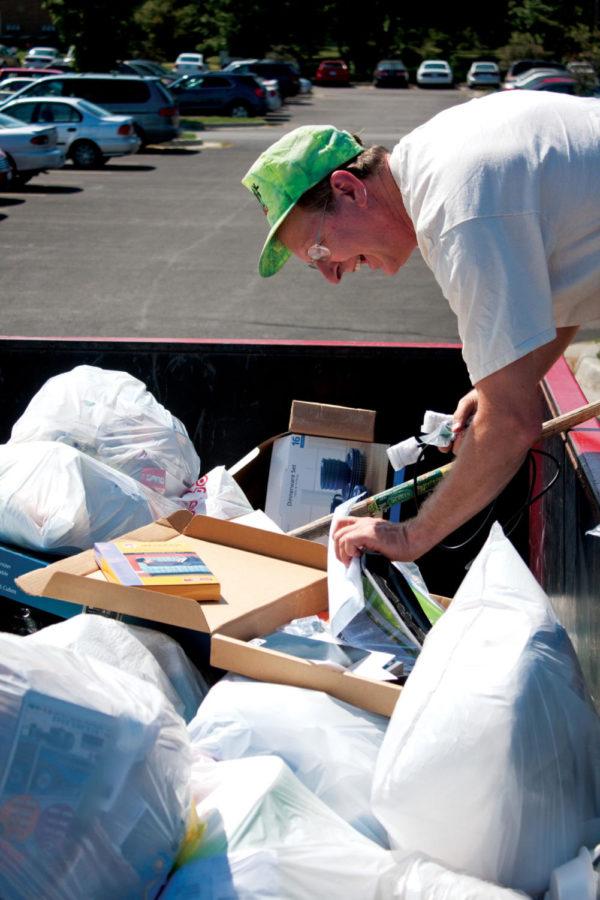Professor does his part by reclaiming trash
August 23, 2011
If you’ve thrown anything into a campus trash container in the past decade, there’s a chance that it’s found its way to Robert “Toby” Ewing.
Ewing, research assistant professor of agronomy, has been reclaiming discarded items around Ames since 2000. He calls his pastime “dumpster diving” for the sake of convenience, but is quick to note that the term is something of a misnomer.
“I don’t actually dive,” he said. “The ISU Police don’t like people getting into dumpsters.”
Ewing said he learned his thrifty ways from his parents.
“This obviously goes way back in the family,” Ewing said. “My father was extremely parsimonious.”
However, Ewing doesn’t think he’s just imitating his father. His training as a soil scientist and his research specialty of nuclear-waste management also play major parts in determining the way he lives.
He doesn’t want to aggravate the destructive effects of human activity on the Earth by wasting materials or allowing them to be wasted.
“This is my small way of trying to make things a little bit less bad,” Ewing said.
‘A kind of anthropology’
Throughout his life, Ewing has struggled to relate to other people and understand social conventions. He attributes this difficulty to the fact that he has Asperger’s syndrome, an autism-spectrum disorder that makes it difficult for sufferers to communicate, read social cues and function in unstructured environments. His former wife and their two sons also have the condition.
Ewing said reclamation (which he calls “a kind of anthropology”) might be one of his methods of overcoming social limitations. He quoted a friend as saying he relates better to dumpsters than he does to people.
“People are almost as complex as soil. And unlike soil, they sometimes talk back,” he said. “Maybe this is my way of learning about them indirectly.”
Though Ewing claims to find social situations challenging, his friends attest to his social strengths.
“He allows me to express myself,” said Helen Gunderson, a congregant in the Unitarian Universalist Fellowship of Ames. “Toby is the kind of person I can talk with in depth.”
Risqué (and risky) recycling
During his years rummaging through trash bins, he has come across some bizarre findings — the strangest being a brand-new “Create-a-Cock” kit that he found in the company of Mike York and Ashley Kyber (now an assistant professor of landscape architecture at West Virginia University) in 2005.
The kit, he said, was “for making a latex mold of your erect penis.” By his account, Kyber quickly laid claim to the kit.
“She declared that since she was [a] sculptor, she was the one who needed to keep it,” he said.
Ewing hasn’t found any items more risqué than the penis-molding kit, but he has found a few of more dubious legality.
In mid-December 2010, he and a middle-schooler he was mentoring found a beanbag chair in a Fredericksen Court waste container.
After taking the chair home, Ewing’s mentee soon noticed something unusual about it. Once, when adjusting the chair in front of the television, the boy heard a sudden thud.
Knowing that beanbag chairs don’t typically make such sounds, his mother was immediately suspicious. On opening the chair to investigate, the two discovered a glass bong and a spice grinder.
In 2009, he made another notable find in Fredericksen Court: 20 full cans of beer. After removing them from the trash, he washed the outside of each can and presented them to picnicgoers at a Unitarian Universalist gathering in Ames.
“The beer was much appreciated,” he wrote in a recent email.
Seeking co-combatants in the war on waste
Ewing does what he can to divert usable materials out of the waste stream, but he wishes he had more help.
He believes most students don’t set out to be wasteful, but end up discarding their possessions because there’s no convenient way to pass them along. He said ISU officials should do their part to ease the process of donation.
“I would love to see the university make it easier for them to see their possessions find a better home,” he said.
Ewing suggested that the Department of Residence place containers inside residence halls where students can put unwanted items. He also said a representative of some student group could go from door to door in the halls, asking residents if they had any usable items to donate.
Brittney Rutherford, Department of Residence marketing coordinator, said Tuesday that programs of the sort Ewing calls for are already in place. She mentioned one called SAVE that the department has run since 2007.
The letters of SAVE form an acronym that stands for “Simple Act, Vital Effect.” At each semester’s end, program coordinators designate rooms in every hall where residents can bring items they don’t want or can’t keep.
As gratifying as he finds dumpster diving, Ewing still dreams of a day when he no longer has a reason to do it.
“It seems like every year we come up with new and more exciting ways to waste,” he said. “I would be delighted to find there was nothing good to take out of the dumpsters.”







